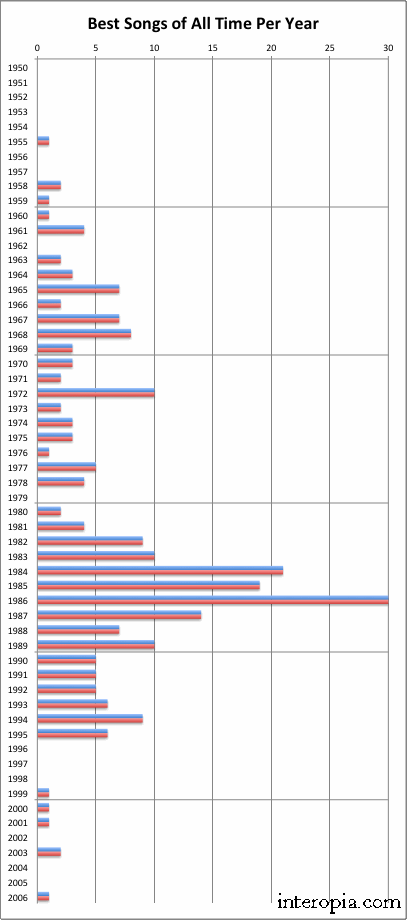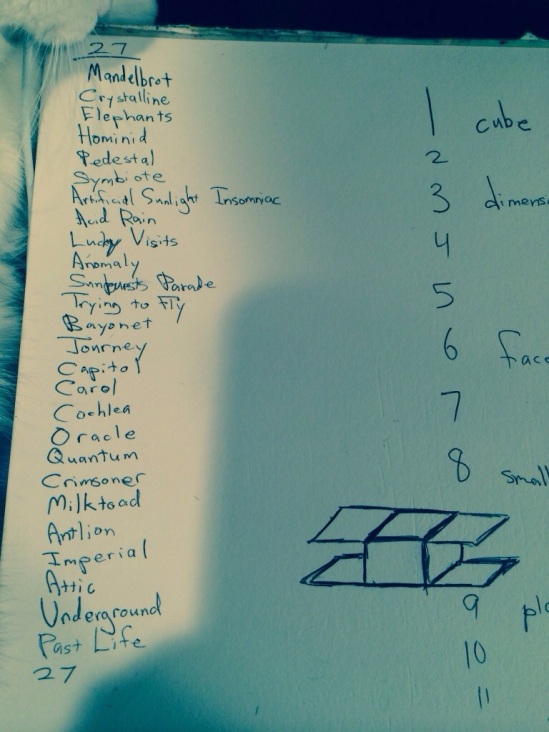It’s the sun in the morning! As we wake this Manhattan Monday, we thank you for taking this journey with us. From here on out you can expect a longer text-based post on Monday mornings, at the very least. Today, a flashback countdown. This year marks the fourteenth anniversary of the end of the nineties, arguably the best decade for music. The editorial staff here at Interopia have spent many long hours in smoky rooms debating and compiling this, our controversial top 100 albums of the 1990s. Disclaimer: saving the hip hop for a future list. Hope you enjoy it and discover something new! Be sure to leave a comment and let us know your personal favorite…
Category Archives: Lists
1986: The Best Year For Music, Scientifically Proven
Interopia is proud to announce the results of a decade-long scientific study concerning the best songs of all time. Today we can conclusively declare 1986 as the best year in the history of music. First proposed in a 2004 study, the “1986 Theory” has now been confirmed by more accurate tests and a larger data sample. The previous study considered 84 of the best songs of all time and found the following results:
As you can see, the songs were clustered in the late 60s/early 70s and again in the mid-80s, with local maximums at 1968 and 1986. 1986 of course had the most (with 12 songs).
A decade later, best song detection technology (BSDT) has improved. The scientists at Interopia have now identified 243 of the best songs of all time. We were curious to see whether the 1986 spike would still hold up with the larger sample:
Sure enough, it did. There were also some other years that emerged with unexpectedly large numbers of songs: 1972 and 1994. On the other hand, we were surprised that even with 243 songs, none of them were first released in 1962 or 1979 (the most likely candidate for worst year in music).
With the number of new discoveries now diminishing with each passing year, it seems unlikely that more accurate studies will lead to a different conclusion any time soon. It also seems unlikely, given the current musical landscape, that a musical revolution will return us to the heights reached during the 1984-87 heyday.
Are you surprised by the results of the study? Let us know in the comments!
27 Track List
The List of Dualities
Dear Interopians, you may remember the post back in November 2012 about our compilation of universal dualities, the fundamental ingredients of our universe. Well, now pictures have been added for every entry on the list and it’s up on Pinterest. You didn’t know Interopia was on Pinterest? Follow Arem on there now!
The Top 15 Drinks
 Hey Interopians, it’s been a while since our last list, hasn’t it? This one has been in the works for far too long. Finally it is unveiled to the world. The greatest drinks of all time.
Hey Interopians, it’s been a while since our last list, hasn’t it? This one has been in the works for far too long. Finally it is unveiled to the world. The greatest drinks of all time.
3 Moments of Inspiration
How do I come up with my ideas? It’s a difficult question to answer. Sometimes they come gradually, and I seem to take part in their formation. Other times the music, images, words, or ideas just pop right in there, already fully formed. Perhaps an easier question to answer would be “When do you come up with your ideas?” There do seem to be certain points during the daily routine that the number of ideas tends to increase. Below are three of the main moments. As you’ll see, they aren’t exactly the times most conducive to remembering something, and the greatest tragedy is all of those lost thoughts that could have been masterpieces but will never see the light of day.
1. On the Road
Whether driving a car or a motorbike, something about navigating the roads always seems to get the ideas flowing. Sometimes it’s out on the open highway. Sometimes it’s a crowded urban commute. The body often goes on autopilot when maneuvering a vehicle, and the mind is allowed access to the subconscious, harnessing the infinite spring of energy from which we are created. The trick is to recognize and remember when a great idea occurs.
 Sometimes I have to repeat the words or tune over and over like a mantra, so that by the time I get to my destination I can still remember it and somehow record it. On longer trips it may be necessary to pull over in order to write down or record the idea. The best option is to have an audio or video recorder always running when on the road, so that no idea can slip away.
Sometimes I have to repeat the words or tune over and over like a mantra, so that by the time I get to my destination I can still remember it and somehow record it. On longer trips it may be necessary to pull over in order to write down or record the idea. The best option is to have an audio or video recorder always running when on the road, so that no idea can slip away.
2. In the Bathroom
Whether it’s showering, shaving, brushing your teeth, or doing something else, the bathroom is a mystical place that can really jumpstart the creative process. Some say it’s the reflective properties of the mirror. Others say it’s the cleansing powers of water. But the inspirational potential of the restroom is a well documented phenomenon seen throughout history, from Archimedes to Emmett Brown. Even an entire religion, The Church of the Subgenius, has recognized the use of the toilet as a form of meditation.
3. On the Brink of Sleep
It’s that moment when moments themselves begin to cease to exist. The borderland between reality and dream. When the mind turns inward and the train of thought starts slipping sideways until it’s headed towards the land of symbols. This is the hardest moment to capture and bring back, because it can be hard to dip your hand in the sand of this land without getting sucked in. If you do manage to hold onto the strange revelations and return to the conscious world, the urge is strong to allow sleep to overcome you again. But if you can resist the temptation to return to sweet slumber, and if you can somehow document it, then this can be one of the deepest and most rewarding moments of inspiration. Best to sleep next to a notebook and voice recorder.
In which situations do you feel the best ideas come to you? Let me know in the comments below!
Top 10 Christmas Songs
I’ve always enjoyed the Christmas songs, both traditional and modern. But this year I find myself bored with many of the classics, like Jingle Bells, Wish You a Merry Christmas, Santa Claus is Coming to Town, Deck the Halls, and 12 Days (fine songs though they are). So here is the first annual Interopia top 10 Christmas songs of all time. Continue reading
Current Various Projects
This is a summary of our current interactive projects. These are available online for anyone to edit. The staff here has done a lot of work on them, but we also need your help too.
Polyglot Vocab Project – An ambitious project to translate the 3000 most common words in English into 10 other languages. So, if you speak some Spanish, Portuguese, French, Italian, German, Russian, Chinese, Japanese, Korean, or Vietnamese, please add as many words as you know to our handy mini-dictionary. Could also be used by English students to improve their vocab.
Essential Vietnamese Vocab Grid – This grid will be indispensable for those of you studying Vietnamese. I made it from scratch when I was learning. It has many of the most important words for everyday usage, and they are arranged in rows and columns by spelling (and therefore pronunciation). Each column represents a different initial consonant and each row represents a different vowel sound. However, I haven’t updated it in a while so I’m sure there are some words missing. Let me know if you can think of any.
Encyclopedia of Vietnamese Fruit – Do you happen to know a lot about the fruits found in Vietnam? If so, help us fill in this table with information about seasonal/regional availability, storage, ripening, recipes, etc.!
List of Dualities – Leave a comment to suggest another one not listed.
List of Famous People – This is sort of an experiment in progress. The definition of famous could be open to interpretation. But let’s try to name the people you personally think are the most famous and important from history. Let’s try to dwell on people who made an impact on society. Who is not already listed?
Timeline of Famous Characters – Here are many of the most famous characters from legend, literature, and popular culture, arranged chronologically. Who do you suggest we add to the list?
Thanks once again for supporting the site. There will be many more projects to come.
List of Dualities
Both science and religion seem to share the common idea that “all is one”. Many religious or spiritual people believe that “God” is everything: the rocks, the plants, the birds, and even you. Similarly, most scientists believe that everything came from a common source, exploding from a singularity 13.75 billion years ago. This idea of unity is also a central tenet of Interopia.
But, if all is one, then why do we see so many instances of two in the world? Somehow the one became two, and how this happened is one of the greatest mysteries of all. It’s no secret to visitors of Interopia that we like to meditate on particular dualities. Of course, what makes a duality is up for debate. But let’s try to focus on basic universal concepts, or ones that relate to the basic human condition. Therefore, something like “Mac/PC” doesn’t count. Let’s try to make a list of the fundamental ingredients of reality. Here’s our list:
All – Nothing
Mind – Body
Black – White
Hot – Cold
Inside – Outside
Me – You
Me – Not Me
Male – Female
War – Peace
Good – Evil
Up – Down
Left – Right
Past – Future
Matter – Energy
Electricity – Magnetism
Visible – Invisible
Pain – Pleasure
Truth – Lie
Right – Wrong
Begin – End
Human – Animal
Alive – Inanimate
Existence – Non-Existence
Asleep – Awake
Dream – Reality
Positive – Negative
Movement – Stillness
Matter – Emptiness
Sound – Silence
Knowledge – Ignorance
Life – Death
Happy – Sad
Form – Formlessness
Permanent – Temporary
Creation – Destruction
Day – Night
Chaos – Order
Beautiful – Ugly
Attraction – Repulsion
Observer – Observed
List of Types of Characters
One of our most popular posts ever is the Timeline of Fictional Characters, which named specific characters from throughout the history of legend, literature, and popular culture. The following is a companion list. This time we name all of the species of characters, rather than specific characters. These are only recurring character types that have occurred in many different sources, not a product of a single franchise. Therefore, there are no Smurfs, Ewoks, or Klingons.
One advantage of seeing all the types of characters laid out like this is that it makes creating a new character very easy. All you have to do it pick two of the following character types and mix them together to create a character never thought of before.
The character types are presented in alphabetical order. Let us know in the comments if any important ones were forgotten.
Descriptors
10 Suggested Features/Products For Apple
You’ve had an amazing decade and I don’t need to list the accomplishments, but let’s look towards the future. Everyone has already noticed that the iPhone, iPad, and iPad Mini are all just the same thing in different sizes. It’s time to really branch out and do something new. As a stockholder myself, I feel compelled to give you a few ideas about what consumers want.
Encyclopedia of Fruits of Vietnam

One of the best things about living in Vietnam is the wide variety of fresh fruits available wherever you go. Don’t you agree? Cheap, delicious, and healthy, it seems fruit is one of the keys to happiness in life. When I first came to Vietnam, I was amazed by all the new fruits I had never seen before. Fruits of all shapes, sizes, colors, and flavors. I didn’t know many of their names and the locals didn’t know the English terms either. However, over time I become familiar with these exotic tropical fruits, and I have catalogued them for you here.
Click here to enter the fully-editable document
But I still need your help. I need to know about each fruit’s availability, average price, and ripening/storage info. If you can, please edit the document and share what you know. For availability we need to know both when and where they are sold. Price will be quite variable of course, but it’s always nice to have a rough guide for reference when going to the local market. My hope is that the knowledge of the masses will provide each of us with what we need to know to become a true pomologist. That means fruit expert.
Comic Collection

The Incredible Hulk #396, the first comic I ever bought (at a neighbor’s garage sale)
Thought some of my friends might be interested in this. Got out the old comic collection from the early to mid 90s and catalogued them. Have a look a look here. As you will see, I was quite a fan of The Incredible Hulk back in the day.
Thanks to my brother who generously set aside time to help me inventory.
A Timeline of Famous Fictional Characters
I love fictional characters. They come from so many different sources: legend, literature, drama, movies, TV, comics, video games…but they all have something in common: they are products of human imagination. Now usually these aforementioned genres are considered separately, but I wondered what it would look like if we just threw them all together. The list is chronological, arranged by date of first appearance, so you can see when each was invented. Some origins were hard to pin down, so the dates for some are approximate. If there are two dates, the first is for the earliest possible origin and the second is origin of the modern incarnation of that character. Anyway, hope you find the list handy, and be sure to leave comments underneath. You can even nominate someone to be added to the list!
The Induction of Alex Trebek
You may remember that a few months ago Interopia unveiled its Hall of Fame, including 70 musicians, writers, actors, entertainers, directors, scientists, artists, and businessmen. That list, however, was just the beginning. Over time additional inductees will be announced. The first of these is genius Alex Trebek, host of TV’s greatest game show, Jeopardy! Welcome, Alex, to eternal membership in the Interopia Hall of Fame.
 Please leave your congratulations for Alex in the comment section below!
Please leave your congratulations for Alex in the comment section below!
Vietnamese Vocab Grid
Here’s the link to the document.
When I started learning Vietnamese I found it interesting that every word was only one syllable. Each word is made up of 4 parts: the (optional) initial consonant, the vowel, the (optional) final consonant, and the tone. Each of these 4 elements only has a finite number of possibilities. There are about 27 initial consonants, 43 vowel combinations, 8 final sounds, and 6 tones. This meant that one could construct a “2 dimensional dictionary” of every Vietnamese word. Whereas a normal dictionary is linear, listing all words in alphabetical order, this vocabulary grid would be arranged alphabetically in two ways, by initial consonant in one dimension and by vowel sound in the other dimension. Such an arrangement makes it easy to see the difference between similar-sounding and similarly-spelled words. A student of Vietnamese could practice pronunciation using the chart, because every word in a given column would have the same initial consonant sound, and every word in a given row would have the same vowel sound. The words included in the project are the most essential words for a Vietnamese language student, particularly if living in Vietnam. The chart is fully editable, so feel free to add any other important words you know. Happy studying and good luck!
The Names of Languages
The names of 13 languages in each of those same 13 languages.
The bold words are the names of the languages in their own language.
Horizontal scrolling enabled.
|
|
Spanish |
Portuguese |
Italian |
French |
German |
Russian |
Arabic |
Japanese |
Chinese (Mandarin) |
Vietnamese |
Korean |
Swahili |
|
English |
ingles |
inglês |
inglese |
anglais |
Änglisch |
angliskiy английский |
alengleziah الإنجليزية |
eigo 英語 |
Yīngyǔ 英语 |
tiếng |
yeong-eo 영어의 |
Kiingereza |
|
Spanish |
español |
espanhol |
spagnolo |
espagnol |
Schpanisch |
ispanskiy испанский |
الأسبانية |
supeingo スペイン語 |
Xībānyá yǔ 西班牙语 |
tiếng |
seupein-eo 스페인어 |
Kihispania |
|
Portuguese |
portugués |
português |
portoghese |
portugais |
Portugiesisch |
portugal’skiy португальский |
البرتغالية |
porutogarugo ポルトガル語 |
Pútáoyá yǔ 葡萄牙语 |
tiếng |
poleutugal-eo 포르투갈의 |
Kireno |
|
Italian |
italiano |
italiano |
italiano |
italien |
Italiänisch |
italianskiy итальянский |
الإيطالي |
itariago イタリア語 |
Yìdàlì yǔ 意大利语 |
tiếng |
itallia-eo 이탈리아의 |
Kiitaliano |
|
French |
francés |
francês |
francese |
français |
Französisch |
frantsuzkiy французский |
فرنسي |
furensugo フランス語 |
Fǎyǔ 法语 |
tiếng |
peulangseueo 프랑스어 |
Kifaransa |
|
German |
alemán |
alemão |
tedesco |
allemand |
Deutsch |
nemetskiy немецкий |
ألماني |
doitsugo ドイツ語 |
Déyǔ 德语 |
tiếng |
dog–il–eo 독일어 |
Kijerumani |
|
Russian |
ruso |
russo |
russo |
russe |
Russisch |
russkiy русский |
الروسية |
roshiago ロシア語 |
Èyǔ 俄语 |
tiếng |
leosia-eo 러시아어 |
Kirusi |
|
Arabic |
árabe |
árabe |
arabo |
arabe |
Arabisch |
arabskiy арабский |
alarabiah العربية |
arabiago アラビア語 |
Ālābó yǔ 阿拉伯语 |
tiếng |
alab-eo 아랍어 |
Kiarabu |
|
Japanese |
japonés |
japonês |
giapponese |
japonais |
Japanisch |
japonskiy японский |
اليابانية |
nihongo 日本人 |
Rìyǔ 日语 |
tiếng |
ilbon-eo 일본어 |
Kijapani |
|
Chinese (Mandarin) |
chino |
chinês |
cinese |
chinois |
Chineesisch |
kitaiskiy китайский |
شجرة |
chūgokugo 中国語 |
Zhōng yǔ 中文 |
tiếng |
jung-gug-eo 중국어 |
Kichina |
|
Vietnamese |
vietnamita |
vietnamita |
vietnamita |
vietnamien |
Vietnamesisch |
v’etnamskiy вьетнамский |
الفيتنامية |
betonamugo ベトナム人 |
Yuènán yǔ 越南语 |
tiếng |
beteunam-eo 베트남어 |
Kivietinamu |
|
Korean |
coreano |
coreano |
coreano |
coréen |
Koreaanisch |
koreiskiy корейский |
كوري |
kankokugo 韓国語 |
Cháoxiǎn yǔ 朝鲜语 |
tiếng |
hangug-eo 한국어 |
Kikorea |
|
Swahili |
swahili |
suaíli |
swahili |
swahili |
Suaheli |
suakhili суахили |
السواحلية |
suwahirigo スワヒリ語 |
Sī wǎ xī lǐ 斯瓦希里 |
tiếng |
seuwahillieo 스와힐리어 |
Kiswahili |
The Polyglot Vocab Project
Did you know there’s really no limit to the number of languages you can learn? The average person can get to a respectable level in a language in about two years of study and practice. That means you could learn 10 languages in 20 years. So that’s what I’m doing. Remember, if you get to 10 languages you can officially call yourself a polyglot!
So far I’ve worked on Spanish, Vietnamese, and a little Japanese. In studying those languages, I found out the two most important things for learning a language: vocabulary and practice. You need words because they are the building blocks of language. You can’t communicate at all if you don’t have them. Especially in the beginning, you need to make an effort to do a little homework and learn as many new words on your own as possible. You need a strong vocabulary foundation so that you can start the other vital part…practicing. With practice everything else (grammar, pronunciation, spelling) will fall into place.
You all know I love lists, so it should be no surprise that I love grids too. What if, I thought, I could make a giant spreadsheet translating the most important words in English into the various languages I wanted to learn? This plan became known as The Polyglot Project. Then I found out there was already a Polyglot Project. So it became the Polyglot Vocab Project.
With the creation of Interopia, it became obvious that crowd-sourcing would be the best way to accomplish this. I’ve already done a lot of the work by creating an approximate list of about 3000 most common words in English. Some words, like about, for instance, will be difficult to translate into other languages, but we will do our best. Other words, like cat, should be pretty straightforward translations. I’ve set up the project for 13 languages besides English: Spanish, Portuguese, Italian, French, German, Russian, Arabic, Japanese, Mandarin, Vietnamese, Korean, Hindi, and Swahili. I narrowed down the languages to these for population, geographic, cultural, and personal reasons. So, the number of words times the number of languages means about 45000 total words that need to be entered.
I have no idea how much interest people will have in helping me complete the project. Even if just one person helps me, it would be appreciated. Just e-mail the site if you would like editing privileges. I’ll be working on it myself even if no one else helps, so you can tune in to see my progress. Whether it takes a month or twenty years remains to be seen. The Google Docs Spreadsheet is available here.
Meet the Interopia Team
Trent, musician
Rock star and songwriter, he just wanted a place to showcase the music he was writing. He didn’t know that so many of his friends would come on board with their own contributions. But he is thankful for them. Their ideas are in line with his own, so he lets them help. Now even he doesn’t know what to expect anymore.
Liffey, lister
Viewing Interopia as a repository for the lists he is constantly creating, he particularly likes those lists related to music, movies, and art. He enjoys all sorts of statistics, records, superlatives, numbers and limits. One specific areas of interest is geography: countries, maps, populations, etc. He currently lives as a teacher and student of languages and life.
Dr. Tiwtta, researcher
A genuine PhD holder who has attended Cornell, Princeton, AND Harvard, Dr. Tiwtta acts as advisor to the group. He is most interested in subatomic particles, atoms, molecules, dinosaurs, sharks, undersea life, cats, robots, computer programming, codes, artificial intelligence, the environment, aviation, rockets, astronomy, planets, and black holes.
Ghoteman, guru
A shaman who spent decades in silent isolation, he only recently returned from his spiritual journey, one which brought him to all seven of the planet’s continents. His interests appear to be meditation, time, movement, change, God, sleep paralysis, lucid dreaming, ghosts, magic, creation, dreams, light, time travel, dualities, destiny, fate, nostalgia, and synesthesia. He’s responsible for most of the artwork on the site. He creates it upon waking from hypnogogic states.
Fenix, sadist
Fenix is an evil daemon, and he’s also one of the editors over here at Interopia. He is most interested in serial killers, genocide, mass murderers, nuclear weapons, disease, hurricanes, typhoons, earthquakes, tsunamis, and other natural disasters.
Barnopulis, dreamer
Even he will admit to be a connoisseur of the absurd. Barnopulis is constantly coming up with new ideas. Usually they are just random and weird, but every now and then they are genius. He’s unemployed and spends most of his time ingesting hallucinogens, marijuana, and alcohol. He’s always whispering in people’s ears.
A love of travel binds them together. Trent and Dr. Tiwtta enjoy road trips and seeing the world. Ghoteman enjoys exploring the realms of the mind. And Fenix likes to teleport between concentric dimensions. At the moment, the group is based in Saigon, Vietnam, so that’s why you’ll see a lot of Vietnam-related content on the site.
Somehow, their collaboration works. The disparate personalities making up the group are the reason why Interopia covers so much ground: lists, original music and art, travel and education-related material. Even though they are all so different from one another, they still manage to come together to create something greater than the sum of its parts, in the most unexpected of ways.
From all of us here at Interopia.com…welcome.
200 Favorite Albums
Interopia’s inbox (interopia@yahoo.com) has been flooded with requests for a top albums of all time list. After much debate, we’ve finally arrived at this list of our 200 favorite albums. Hopefully you can discover one or two new ones.
The Top 10 Shapes
Hey everyone, Trent here. Today let’s learn about the ten best shapes in the history of the universe. There will be polygons and polyhedrons, and I may just throw you a curve ball or two. Be sure to leave a comment about what your favorite shape is!
25 Favorite Video Games
For someone who doesn’t really consider himself a gamer, I have played a lot of video games. This is thanks to my brother, my mom, and various friends over the years. Every now and then a particular game will grab and hold my attention and I will play it for hours and days on end. Here is a list of those games that have gotten me addicted at one point or another. However, rather than rank specific games, I will instead rank game franchises. In parentheses I have written the game system I originally played it on (though most of them have appeared on multiple systems). Continue reading
Interopia Hall of Fame: Contest Results!
As you know, this past week we had a contest here at Interopia. After one week, over 500 people representing 45(!) countries had submitted their lists of the people they recognized in the picture we posted. However, only one person answered perfectly. So congratulations to a Mr. Musiyoki of Kenya, who was the grand prize winner. Here is the final list of the people in the picture:
Wes Anderson (director)
Paul Thomas Anderson (director)
Alex Grey (artist)
William Shakespeare (writer)
Jonny Greenwood (musician)
Gary Larson (cartoonist)
Charlie Kaufman (writer)
John Coltrane (musician)
Frank Zappa (musician)
Captain Beefheart aka Don Van Vliet (musician)
David Bowie (musician, actor)
Eddie Vedder (musician)
Brian Eno (musician)
Dave Grohl (musician)
James Joyce (writer)
Bill Watterson (cartoonist)
T.S. Eliot (poet)
Bill Murray (actor)
Roald Dahl (writer)
Matt Groening (cartoonist)
Weird Al Yankovic (musician)
H.R. Giger (artist)
Jim Varney (actor)
Bill Hicks (comedian)
Rowan Atkinson (actor)
Conan O’Brien (television)
Tommy Wiseau (writer, producer, director, actor)
Jeff Bridges (actor)
Cedrix Bixler-Zavala (musician)
Maynard James Keenan (musician)
Omar Rodriguez Lopez (musician)
Syd Barrett (musician)
Trent Reznor (musician)
Kurt Cobain (musician)
Thom Yorke (musician)
Josh Homme (musician)
Stephen King (author)
Salvador Dali (artist)
Samuel Beckett (playwright)
Andy Kaufman (comedian)
Darren Aronofsky (director)
Philip K. Dick (author)
Alan Watts (writer)
Joel and Ethan Coen (director)
Kurt Vonnegut (author)
Haruki Murakami (author)
Billy Corgan (musician)
Roger Waters (musician)
Nick Mason (musician)
Rick Wright (musician)
Charles Michael Kitteridge IV aka Black Francis aka Frank Black (musician)
M.C. Escher (artist)
Win Butler (musician)
Alfred Hitchcock (director)
Steve Jobs (businessman)
Jimi Hendrix (musician)
Miles Davis (musician)
Stephen Hawking (scientist)
Phil Collins (musician)
David Cronenberg (director)
George Orwell (author)
Stanley Kubrick (director)
David Gilmour (musician)
David Lynch (director)
John Lennon (musician)
Ringo Starr (musician)
Paul McCartney (musician)
George Harrison (musician)
Stay tuned for more contests in the near future!













